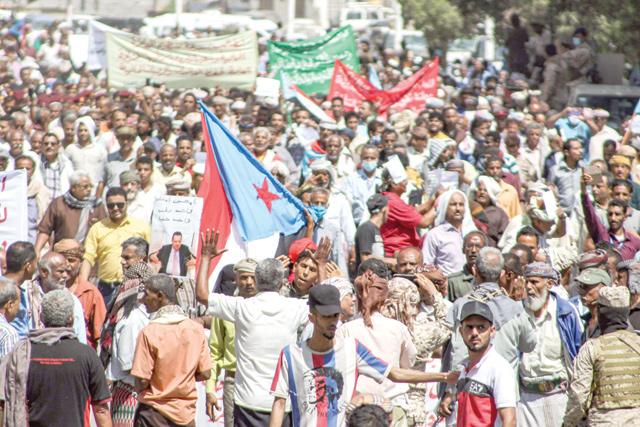- International News
- Web-2021-03-17 | 02:19 pm

Hundreds of angry Yemenis stormed the presidential palace in Aden on Tuesday protesting poor living conditions in the war-torn country but were eventually pushed back peacefully, an AFP correspondent said.
Protesters, including retired military and security officers, marched in the southern port city, the de facto capital where the internationally-recognised government is based.
"Revolution, revolution in the south," they shouted.
Palace guards shot into the air but protesters continued to march in.
The crowd remained in the building for over an hour before dispersing.
A government official told AFP that Yemeni and Saudi forces escorted to safety members of the Cabinet, including Prime Minister Maeen Abdulmalik Saeed, to the military intelligence building on the palace grounds.
Protesters told AFP that they were angry over a lack of services and a delay in the payment of salaries.
Some carried flags of the southern separatist movement.
Yemen's government was formed in December under a Riyadh-sponsored power sharing agreement between ministers loyal to President Abed Rabbo Mansour Hadi and supporters of the secessionist Southern Transitional Council (STC).
Both are technically fighting the Iran-backed Houthi rebels, who control the capital Sanaa in the north.
But the STC has sought to restore South Yemen's independence from the north. The two sides unified in 1990.
Aden residents claim the new government has not done anything to remedy price inflation or repeated power cuts.
The United Nations called Tuesday for an independent probe of a fire in Yemen's capital that killed dozens of migrants in a holding facility.
"There must be an independent investigation into the cause of the fire," the UN envoy for Yemen, Martin Griffiths, told the Security Council.
Human Rights Watch (HRW) earlier on Tuesday blamed the March 7 fire on "unidentified projectiles” fired by Yemen’s Houthi rebels.
The Iran-backed militants control much of northern Yemen, including the capital Sanaa, which was captured from the Saudi-backed government in 2014, sparking a devastating war.
Griffiths said, "The world was reminded of the plight of the migrant community last week when an extraordinary, horrific fire broke out at a detention facility in Sanaa holding predominantly Ethiopian migrants.”
He said dozens were killed in the fire and over 170 seriously injured.
HRW said detainees had been protesting against overcrowding when camp guards rounded up hundreds of them into a hangar and fired two projectiles into the building.
"The migrants said the first projectile produced a lot of smoke and made their eyes water and sting. The second, which the migrants called a ‘bomb,’ exploded loudly and started a fire,” HRW said.
"Houthi authorities should urgently engage with Ethiopian authorities whose nationals are languishing in Yemeni detention centres under their control,” HRW said.
Yemen has been embroiled in a civil war between the government — backed by a Saudi-led military coalition — and the Houthi rebels since 2014, pushing the country to the brink of famine.
Tens of thousands of people, mostly civilians, have been killed and millions displaced in the conflict, which has crippled the economy and healthcare system.
The UN calls Yemen the world’s worst humanitarian crisis.













